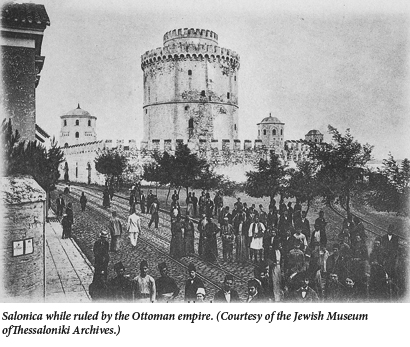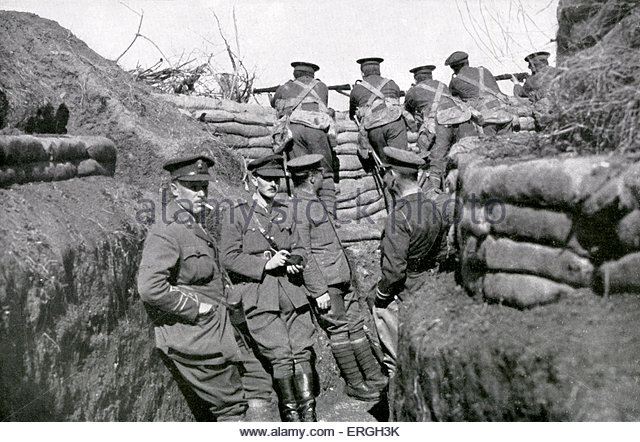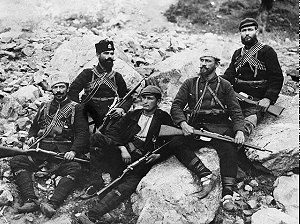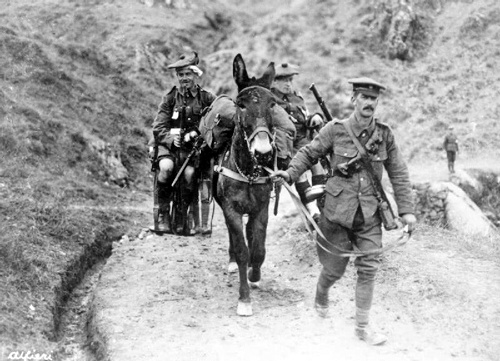Greece is Now in the Fight, Seeking Ancient Lands
Most Troops Dying from Malaria, Other Diseases.
Special to The Great War Project
(9-12 September) On this day a century ago, there is much news from a lesser known theater of the war.
Another front is opening in the war. It is the Salonika Front, centered at a port in northeastern Greece, near the hostile Bulgarian border.

The White Tower, overlooking the Mediterranean at Salonika.
“The Allies chose to set up another front based in Salonika [now Thessaloniki] Greece,” writes historian Michael Neiberg. It’s a complex operation. It is designed to give Serbian forces, allied with Britain, France, and Russia, “a place to fight and to help the Russians.”
It begins with troops from France and Britain and grows rapidly to 150,000 troops.
But there is skepticism about its utility. It is commanded by a French general “who had grown unpopular with the high command.”
All told, writes historian Martin Gilbert, the first Salonika offensive involved French, Russian, Serb, British, and Italian troops.
“They spent months training and the superiors in Paris and London thought the expedition was a political idea,” Neiberg writes, “with little military utility.”

British troops in the trenches at Salonika, autumn 1916.
The view from the French and British command is that “anything sent to Salonika weakened the Western Front. They refused to send men and supplies except when ordered.”
The British and French land most of the troops. “Their landing at Salonika,” writes war historian John Keegan, “had been made without a by-your-leave…The Allies proceeded to transform their Salonika base into an extraterritorial military settlement.”
The Greek King, King Constantine, “at one point protested feebly,” Keegan reports, “I will not be treated like a native chieftain.” But that is precisely how the Allies treated Greece.

A group of Bulgarian irregulars, date and place uncertain.
The enemy of the Allies at Salonika, mostly Bulgarian troops, holds the high ground and proves a scrappy opponent. Inaction at Salonika is leading to morale problems among the Allies.
The Allied advance is initially successful, but soon stalled when it reaches the higher mountains of the Balkan territories. The Serbs briefly recovered a few hundred yards of Serbian territory, reports Gilbert, “but they were driven back.”
And they are facing another challenge: the government of Greece is proving unenthusiastic about its part in the Allied offensive. Many political factions in the Greek government, reports Neiberg, “did not favor the Allied presence in their country, despite their desire to gain territory at the expense of the Ottoman Empire.”
Adds Neiberg, “the Allied offensive soon stalled – the problems of morale, supply, and difficult terrain remained.”

Wounded British troops transported by mule, Salonika front.
The Allies in Salonika soon come to be known by derisive nicknames such as The Gardeners of Salonika and The Largest Internment Camp in Europe.
The troops on the Salonika Front do suffer nevertheless.
“Malaria, endemic in northern Greece caused ten casualties for every one inflicted by the enemy,”…
…reports war historian Keegan, “and from the mosquito, as long as the Allies remained in the disease zone there was no escape.”
“Casualties from disease sometimes exceeded one hundred percent of the strength of some units present.”
